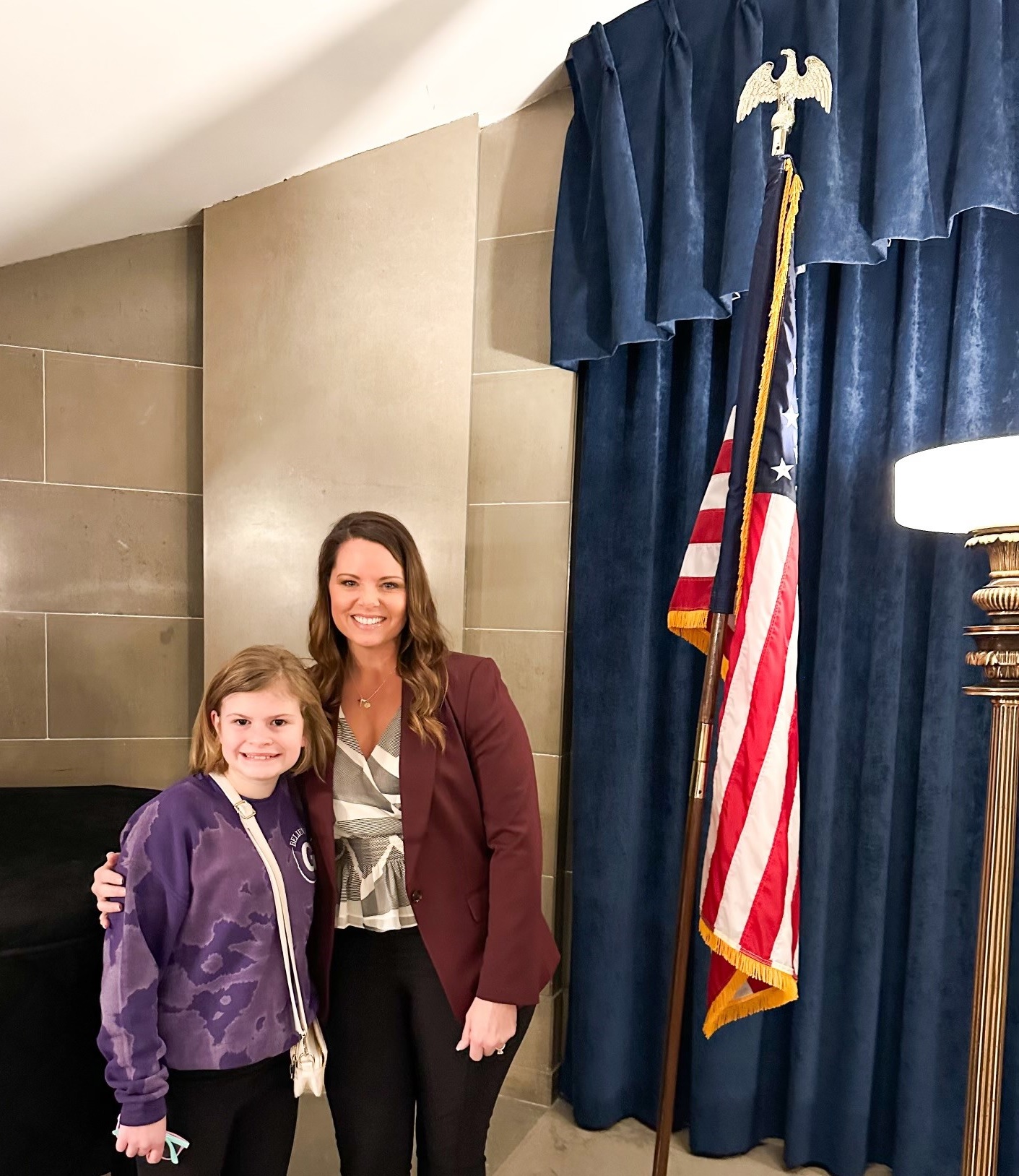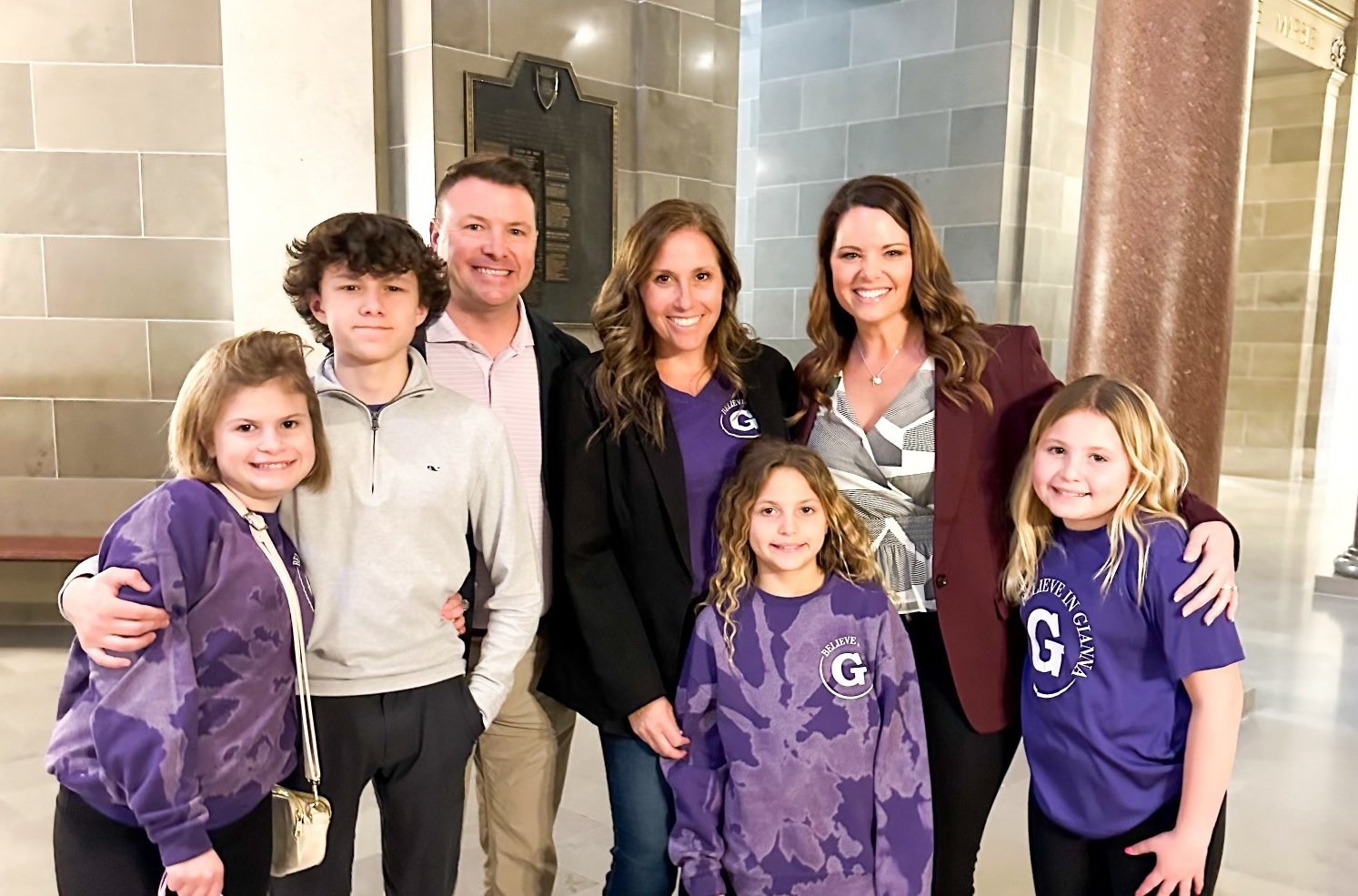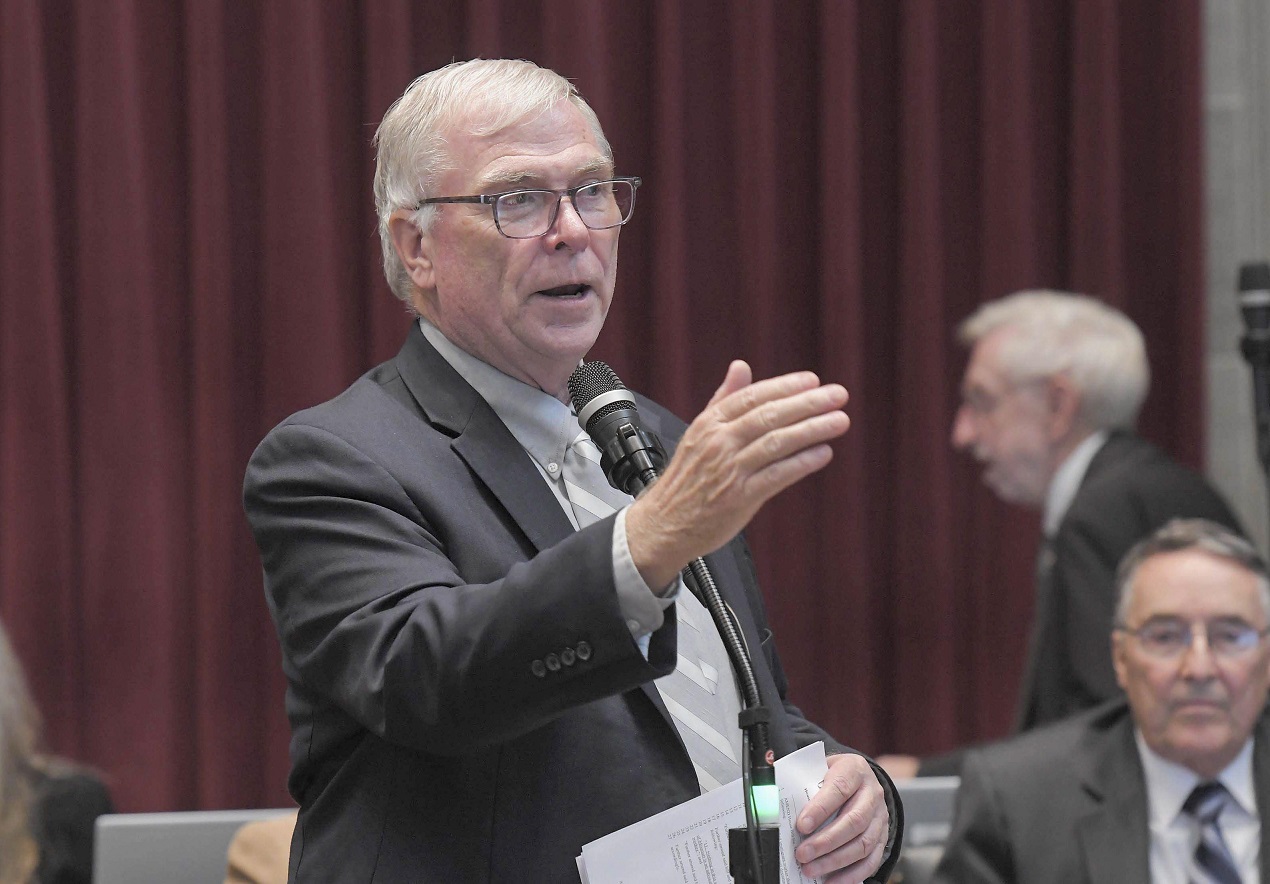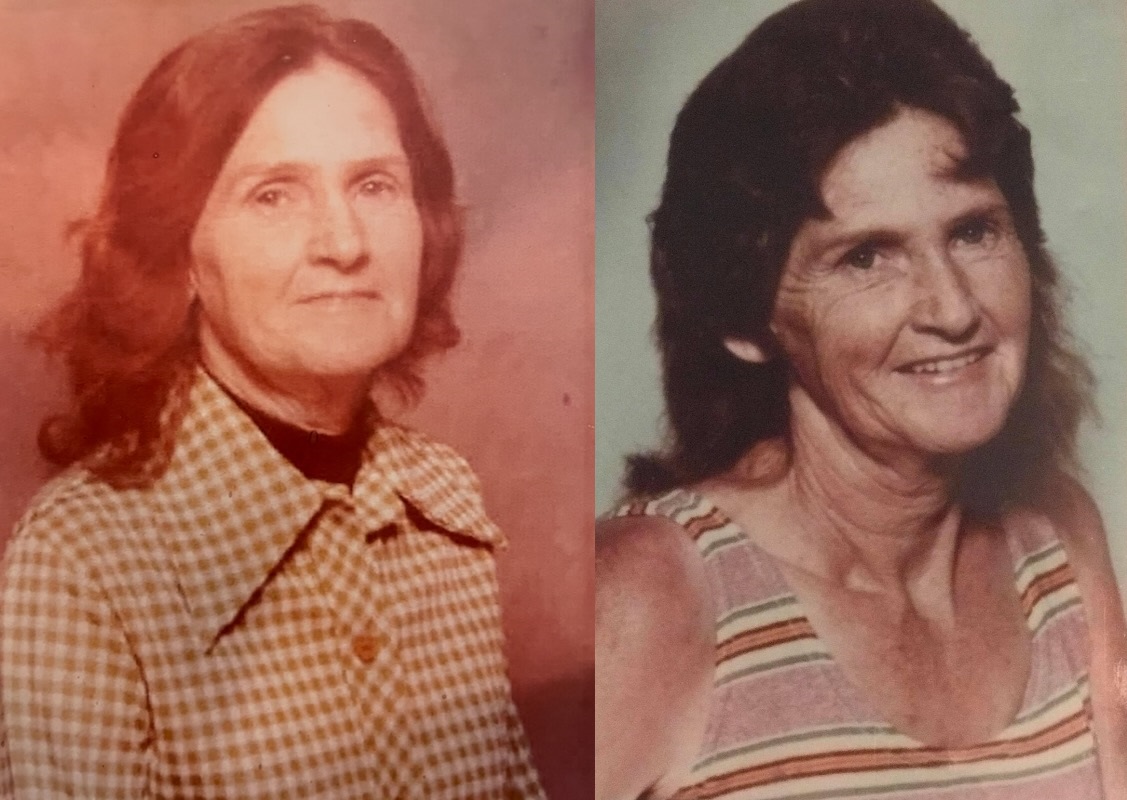Missouri House Democrats spoke to reporters after the close of legislative work for the week:
Family of girl with rare condition urges House to ‘Believe in Gianna,’ help raise awareness of Sanfilippo Syndrome
The family of a little girl afflicted with what is sometimes called “childhood Alzheimer’s” is asking the legislature to make her birthday a day to raise awareness, to thereby improve the lives of other children faced with this rare condition.

Gianna Marie Wacker wasn’t expected to live past her early teens. When she sat with her family in a House committee hearing last week she was exceeding those expectations.
“Our Gianna is a unicorn. Her doctors describe her as that because she’s 15 years old, and she’s still doing pretty good, so we’re proud to have her here today,” Representative Holly Jones (R-Eureka) told her fellow legislators.
Gianna smiled through the entire hearing, as her siblings, parents, and grandparents laughed and smiled with her, proud of their “unicorn.” Just feet away, Jones and others fought back tears explaining Gianna’s condition, Mucopolysaccharidosis type III, more commonly called “Sanfilippo Syndrome.” It is thought to affect as few as nine out of every million babies born, worldwide.
Gianna’s younger brother, Luke, told lawmakers, “Because of this disease, G has never learned to read. She used to be able to play soccer and enjoy dance class. She is losing the ability to write letters to her friends and communicate appropriately.”
What they’re asking of the legislature is to make November 13 each year, “Believe in Gianna Day.”
“A naming bill doesn’t seem very powerful, but awareness is the key factor in this disease to help promote a cure,” explained her father, Jackson Wacker. “Rare disease, as most of you know, is a difficult situation for any family, for any individual, and the most powerful thing we can do is to raise money to help find a cure, and awareness is a key component in that. [‘Believe in Gianna’] will not only be a huge win for our family, but a huge win for any child suffering from a rare disease that will take their life.”
Gianna’s mother, Theresa Wacker, said awareness is also important for potentially helping other children who have the condition but it hasn’t been diagnosed. She explained to the House Committee on Tourism that before doctors finally stumbled upon Gianna’s diagnosis on June 15, 2021, the family had been wondering for six years what was wrong.

Backers of House Bill 2580 explained that an earlier diagnosis could mean that a child would be more likely to get into medical trials. Such trials could benefit not only participants but others suffering from the condition, as doctors search for a cure.
Theresa said the bill also seeks to build on, and continue, what’s been happening in her community. Since Gianna’s diagnosis, there have been several fundraising events, including two golf tournaments held at a local golf club; signs have sprung up around Eureka with the word “believe,” in Gianna’s handwriting; and more than $100,000 has been raised for the Cure Sanfilippo Foundation.
“This is a movement,” Theresa told the committee. “G is moving mountains right now. She is changing the world with her smile every minute of the day, and that is what we hope to do and continue to do, so [Believe in Gianna Day], it would be amazing for not just her but for all these children in the world suffering from this.”
Jones said what the family has done has been truly inspiring, and they hope a Believe in Gianna Day will expand it.
As Luke Wacker put it, “Please consider Believe in G Day in Missouri to celebrate not only my sister but all these other children suffering from Sanfilippo Syndrome. We believe in G, and I want all of you to believe in G too.”
Note to media outlets: the original version of the bill would have created “Believe in G Day,” but the committee voted to change that (with the family’s blessing) to “Believe in Gianna Day.” Some audio cuts reflect the earlier version of the proposal.
VIDEO: House Democrats discuss gun issues, legislation
House Democrats today spoke about firearms issues and legislation, and fielded questions from reporters:
VIDEO: House Republican media conference 02-15-2024
Missouri House Republicans spoke to reporters after the close of legislative work for the week:
VIDEO: ‘Valentine’s Law’ named in honor of fallen detective, would target those fleeing from law enforcement
Law enforcement from throughout the state joined Representative Justin Sparks (R-Wildwood), House Speaker Dean Plocher (R-St. Louis), Senator Tracy McCreery (D-St. Louis County) and Missouri Attorney General Andrew Bailey (R) to talk about Sparks’ House Bill 1692.
The bill, which is backed by the Law Enforcement Legislative Coalition (LELC), would create “Valentine’s Law,” named for St. Louis County Police Detective Tony Valentine. Detective Valentine died in the line of duty in 2021 after his vehicle was struck head-on by a suspect fleeing authorities in a stolen vehicle.
HB 1692 would create the offense of “aggravated fleeing from a stop or detention of a motor vehicle.” This would make it a felony for an individual to knowingly evade law enforcement during an attempted vehicle stop.
See what law enforcement and these officials had to say about HB 1692 and senate version, which is sponsored by Sen. McCreery, and about how the bill would honor Detective Valentine:
VIDEO: ‘Baby Box,’ created by House efforts, used for first time to safely surrender a newborn
For the first time in Missouri a “Baby Box,” allowed in state law thanks to a 2021 House bill, has been used to safely hand over a newborn to emergency officials.
Last Thursday a baby girl believed to have been several hours old was left in the “Safe Haven Baby Box” at a Mehlville Fire Protection District Station 2. The child was taken to a local hospital, and is now in state custody. Authorities said she is in perfect health.
For mothers in need of help, the Safe Haven Crisis Line is (866) 99BABY1, or visit shbb.org
The Baby Box, installed in August and the only one in Missouri, is built into an outer wall at the Fire Station. It allowed the mother to place the girl into a bassinet and close the door. This triggered alarms in the fire station to let personnel know that a child had been relinquished.
Missouri law has since 2002 allowed for babies to be dropped off at places including hospitals and fire stations. The 2021 proposal from Representative Jim Murphy (R-St. Louis) to allow Baby Boxes in Missouri meant to expand on that 2002 law, to allow a person to drop off a baby without interacting with anyone, and with complete anonymity.
Murphy shared the news with his fellow legislators on Monday, and commended the little girl’s mother.
See our earlier story on the installation of this Baby Box
“She should be honored for making a great decision for a baby girl, who now will have a fruitful life,” said Murphy. “I personally would like to thank everybody in this body who voted for that bill, because today we celebrate life and saving a baby’s life, and I think that’s something worth celebrating and I think we should all be very proud of that.”
Tougher penalties proposed for those who roam neighborhoods checking car doors
One state lawmaker says too many Missourians don’t feel safe in their own neighborhoods, and he believes tougher laws are the answer. A House panel has endorsed his proposal.

Representative Jim Murphy (R-St. Louis) says groups of individuals are routinely going through neighborhoods in his south St. Louis County district seeking opportunities to steal from homes and cars. This typically involves pulling door handles on multiple cars, looking for those that are unlocked.
“This is happening every night in St. Louis County, every single night. If you have a Ring doorbell you get these neighborhood alerts. Every single day I get, oh they’re checking doors in this neighborhood, they’re checking doors in that neighborhood. It’s just something now that is neighborhood terrorism,” Murphy told the House Committee on Crime Prevention and Public Safety.
Murphy told his colleagues that the people committing these acts feel no fear of punishment. He said the way Missouri statutes are written doesn’t cover these acts, or they fall under crimes which carry too little punishment. In incidents involving juveniles, the penalties are so lenient that when law enforcement does catch them in these acts, they are often simply let go.
He is sponsoring House Bill 1510, which would create the crime of “unlawfully gaining entry into a motor vehicle,” defined by the act of lifting the handles of, or otherwise attempting to open, the doors of successive vehicles in an attempt to gain entry. It would be a class E felony, punishable by up to four years in jail and a fine of up to $10,000.
It would also extend the crime of second-degree burglary to include unlawfully entering a vehicle, or any part of a vehicle, with the intent to commit a felony or theft. A person could commit such an offense with any part of the body, or with an object connected with the body. Burglary is a class D felony, which carries up to seven years in prison. If a person violating this provision has or steals a firearm, it would be a class C felony, punishable by three to ten years in prison.
“I voted for it in the past, I intend to vote for it now,” Representative Robert Sauls (D-Independence) told Murphy, but he questioned the design of the legislation. He and others on the committee asked whether these acts could fall under existing crimes without creating a new offense.
Murphy said it’s time to be more pointed.
“Doesn’t it send a message? If there’s a law out there that says you can’t tamper with, pull a door handle … now the word’s out,” Murphy said. “I think you really need it to be specific to make it known that this is the crime.”
At least one committee member, Representative Holly Jones (R-Eureka), said she is in full support.
The committee has voted to advance that bill. It will next be considered by another committee, and from there could be sent to the full House for consideration.
VIDEO: House Republican and Democrat media conferences
Missouri House Republicans and Democrats addressed reporters and answered questions after the close of legislative business for the week:
House proposal could close missing persons cases, finally giving answers to families
For more than four decades, two Missouri families have been among an untold number who are going through the anguish of not knowing what happened to a loved one who simply vanished. Backers of a proposal coming before a House committee this week say its passage could be the key to immediate answers in those cases and many more, not just in Missouri but nationwide.

“I still have hope. I still hope we can get something done,” Steve Crump said. He has never stopped looking for his mother, who has been missing for 47 years.
53-year-old Geneva Verneal Adams usually didn’t go out at night, and she didn’t drink, but she loved to dance, so on July 14, 1976, she asked her daughter to go out with her. Lonely after her first husband had died and a second marriage ended in divorce, she was smiling big when she left, hoping to have a fun night out.
Her daughter decided to call it a night early, but Adams was enjoying dancing with a man she’d met at the Artesian Lounge in Herculaneum and opted to stay. Adams left the bar with him around 1 the next morning. What happened to her after that has never been known.
Crump, who was 17 when his mother went missing, has never given up looking. Many years and many disappointments later, a police officer – the son of one of the original detectives on his mother’s case – gave him another glimmer of hope. He had learned of a body that had been found just weeks after his mother disappeared and in the same general area, went unidentified, and was buried not far away in Illinois. Many of its characteristics matched those of his mother, and it was going to be exhumed to see if this was Geneva.
When the grave was opened, it was empty.
Some 90 miles away and three years after Geneva disappeared, 19-year-old Cheryl Anne Scherer called home from her job at a small self-service gas station in Scott City. She talked to her mother about what would be served for dinner that night and some sewing Scherer planned to do when she got home. Authorities can account for all but ten minutes of what went on after that phone call, and in that ten-minute window, something happened to Scherer and her family never heard from her again.

More than 14 years passed before Diane Scherer-Morris accepted that her sister might never come.
“I can attest to my dad sitting on the stair steps, because the phone was next to the, going up the stairs, and just sitting there and sobbing sometimes because he just wanted that phone to ring … but we never got the phone call that it was her, or that they’d found her,” Diane told House Communications.
Both of these are families holding on to hope, and both of them could stand another chance of finally getting closure through the passage of House Bill 1716.
Both are asking lawmakers to give them that chance.
HB 1716 would require that all law enforcement agencies in Missouri participate in the National Missing and Unidentified Persons System, better known as NamUs. It is a nationwide database of cases of missing persons and unidentified human remains. Each case entry might include physical descriptions or DNA evidence, or both.
That database was launched in 2007. The more data is entered, the more open cases of unidentified bodies and missing persons can be advanced and even solved, and more families like those of Geneva Adams and Cheryl Scherer can finally get answers.
Many law enforcement agencies, however, still don’t enter their information on such cases into that database. Only 12 states require that the agencies within their borders participate. By proposing HB 1716, Representative Tricia Byrnes (R-Wentzville) wants to bring Missouri into the fold.
“Really it’s an awareness bill. It’s going to create awareness that this tool is available because if everyone participates, the data becomes more reliable,” Byrnes said. “The more states that can come on board, the better off the entire country of finding missing persons will be, because we won’t have these holes across the country.”
NamUs currently records that there are about 120 unidentified bodies in Missouri, but the real number is likely far greater.
Getting all Missouri agencies to participate in NamUs would not only lead to answers in this state but anywhere in the U.S. Data in the System has resulted in connections that span multiple states, such as when a body found in 1982 in Arizona was just three years ago identified as that of a teen who disappeared from St. Louis in 1981. That case remains unsolved, but her family was “awestruck” to finally know what happened.
Cheryl Scherer’s brother, Anthony, said he is more than ready for his family to also get an answer. For these long decades, he has considered the numerous theories that have been proposed about what happened, including that Cheryl was a victim of notorious serial killers Ottis Toole and Henry Lee Lucas, who authorities say were operating in the region at the time.
“It could be anything,” Anthony Scherer said. “[Maybe] a local person might have had something to do with it and has been holding it all these years. One of the things that we stress when we have get-togethers is the conscience part of it, that they’re getting toward the end of their life and that maybe one day they’re just going to have to get something off their conscience and say something they know or admit to doing something. As far as that, that’s the best answer I can say because there’s just not a whole lot to go on.”
Steve Crump wants this bill to pass so that other families might be spared the years and years of pain he experienced. He still thinks his answer could be found with the body that was supposed to be in that Illinois grave.
“Everything matched … she [had] brown hair, hazel eyes, they had all this information about this woman. The coroner said she was in between 30 and 60, so our mom would fall in there,” Crump said about just some of the details that matched. “We got our hopes up. Oh my gosh, I really thought that this was it, we’re going to find her.”
Geneva Adams’ case is a perfect example of why more agencies need to get active with NamUs, according to Courtney Nelson, Board Member and Advocate of the Missouri Persons Support Center.
She said if the System had been in place in 1976, authorities might have sooner made the connection between that body and Adams’ disappearance. Instead, it wasn’t made until 2018, and poor documentation appears to have led to digging up the wrong grave.
“We can avoid all of that by really utilizing NamUs,” Nelson said.
Nelson is one among those who brought the idea to Rep. Byrnes. She said passing HB 1716 would send a message to families like those of Geneva Adams and Cheryl Scherer, that law enforcement still cares and hasn’t forgotten.
Click here at 4pm Wednesday, February 7, to see the hearing on HB 1716
HB 1716 will be the subject of a hearing by the House Committee on Emerging Issues, on Wednesday at 4:00. The hearing can be watched live through the House website, but Rep. Byrnes is calling on those concerned with missing persons to come and testify or submit testimony online.
Crump said if HB 1716 passes, his family might at last get to do one simple thing for his mother.
Scherer-Morris and her brother hope for the same thing.
“We actually have a tombstone and [Cheryl’s] is between mom and dad’s, so my ultimate goal before I die,” Scherer-Morris struggles to say as the tears come, “and I think we all feel this way, is that we just want to find her and give her a chance to lay next to mom and dad. She didn’t deserve this. She missed out on a lot of life and we missed out on having her in our lives, so the ultimate goal would just be [to be] able to find her and lay her to rest between mom and dad. I just feel like that’s what we owe, to keep trying to find, for her. We have to keep being her voice, we have to keep being her advocate because she can’t do that for herself.”
HB 1716 would also require additional training for law enforcement on unidentified and missing persons cases; require that fingerprints from unidentified remains be submitted to the Highway Patrol and that a dental examination must be performed on remains; and that an unidentified person record in NamUs be created within 30 days of the discovery of such remains.
VIDEOS: House Republican and Democrat media conferences
Missouri House Republicans and Democrats addressed reporters and answered questions after the close of legislative business for the week: